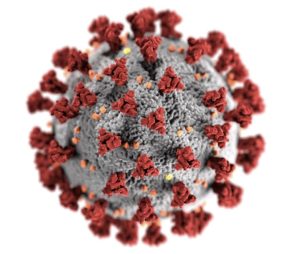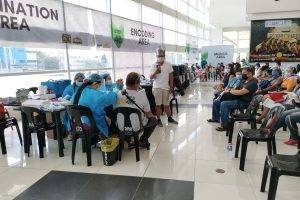Interview on the COVID-19 omicron variant with Dr Leong Hoe Name, and Dr Ling Li Min from Rophi Clinic, Singapore
The COVID-19 pandemic is an ongoing global pandemic caused by severe acute respiratory syndrome coronavirus 2 (SARS-CoV-2). In the past two years several variants have emerged that are spreading globally, with the most notorious one being the Delta variant. It was first detected in India in early 2020, now responsible for majority of the new cases and deaths worldwide.
The newly discovered B.1.1.529 Omicron variant was first reported to World Health Organisation (WHO) from South Africa on 24th November 2021. On 26th November, WHO declared it as a variant of concern due to its highly transmissible nature. In recent weeks, the Omicron variant has been linked to a surge in COVID cases in South Africa. Japan is now the first country in the world to announce border closure to all foreign entries citing the high transmission rate of Omicron variant.

Figure 1: SARS-CoV-2 3D Model
Where and when was it found?
It was first detected in Southern African regions, reported by South Africa authorities to WHO on 24th November 2021. Patients were having mild symptoms. Soon afterwards, 13 cases were detected in Netherland, with more in Denmark, Austria and many other EU nations.
How does Omicron compare to other variants?
Differences: So far, preliminary result from studies have shown that the Omicron variants are more transmissible than other known variants, including the current Delta variant. Omicron has more than 30 mutations on its spike protein, more than double the number carried by Delta. The spike protein is used by virus to attach and invade human body cells.
Similarities: Patients infected with Omicron variants have similar symptoms compared to other variants. Common symptoms include fever, cough, shortness of breath, tiredness, loss of taste or smell etc.
Will current COVID vaccinations work against Omicron?
In short, we don’t know. At the present time, WHO is coordinating with a large number of researchers around the world to better understand the Omicron variant.
There is no current evidence suggests that the vaccination scheme does not work against Omicron variant infection. Vaccination remains critical to reduce community infection, disease severity and death rate. Studies are underway to investigate the effectiveness of current vaccines against the Omicron variant.
Stéphane Bancel, CEO of Moderna (current COVID-19 vaccine), has told the Financial Times: “I think it’s [vaccine effectiveness] going to be a material drop. I just don’t know how much because we need to wait for the data. But all the scientists I’ve talked to … are like ‘this is not going to be good’,”
Will current COVID treatments work against Omicron?
Sadly, we are not certain about this either.
Current treatments including molnupiravir, remdesivir, which stops the virus from replicating in our body cells, should in theory work against the Omicron variant. However, antibody serum developed against specific COVID variants previously might have diminished effectiveness against Omicron.
What are Asian countries currently doing?
With the recent lessons learnt from the Delta variant, many countries have already begun to impose further restrictions to travellers from abroad.
Hong Kong has expanded their curbs on entry for non-residents from several countries, including banning the entry of non-residents from several African countries such as Angola, Ethiopia, Nigeria and Zambia as of Nov 30, in addition to other African nations such as South Africa, Botswana, Eswatini, Lesotho, Malawi, Mozambique, Namibia and Zimbabwe.
Singapore’s Ministry of Health (MOH) has also restricted travellers with recent travel history to Botswana, Eswatini, Lesotho, Mozambique, Namibia, South Africa and Zimbabwe starting from 11:59pm on 27 Nov (Saturday).
Thailand and Indonesia have both also carried out similar bans to travellers with recent travel history to these African countries, amidst concern over the Omicron variant.
What can I do to prevent infection?
General preventative measures for Omicron are the same as previous variants, as they transmit between people in exact same fashion.
- Mask wearing: the single most effective way in reducing transmission
- Maintain social distancing whenever possible
- Avoid public gathering
- Open windows to improve ventilation
- Hand hygiene: avoid touching facial areas unless hands are clean
- Get vaccinated: consult your doctor for advice if you are unsure of whether you are eligible for vaccinations or not.











